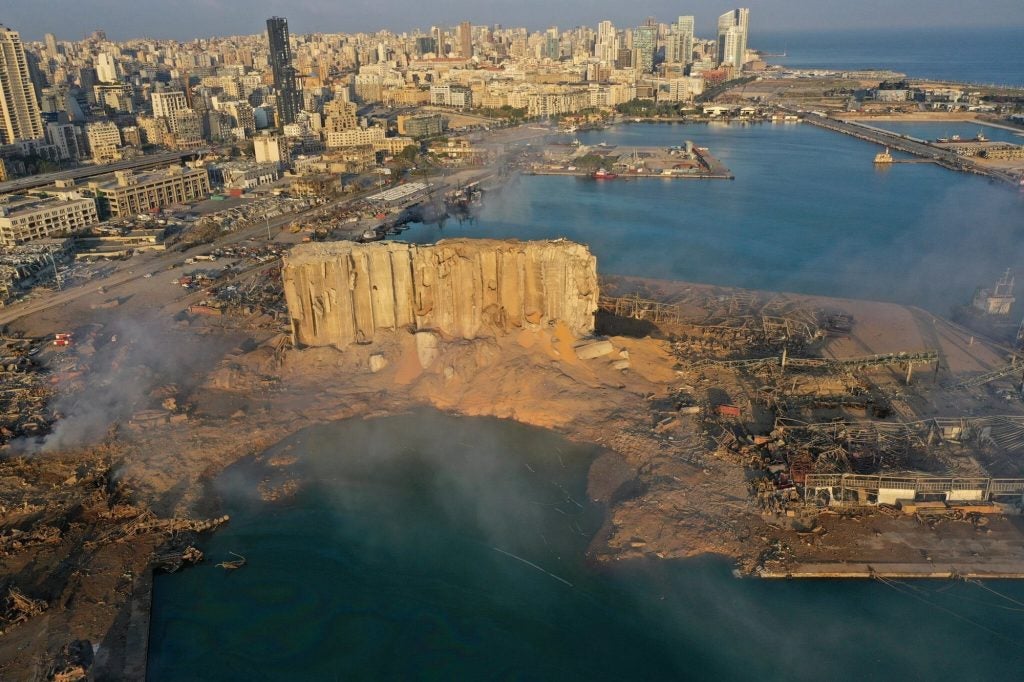State of Emergency In Beirut After Port Explosion
The government of Lebanon has declared a two week state of emergency in Beirut, following a massive explosion in the Port of Beirut on Tuesday. The declaration places the Lebanese Armed Forces in charge of security in the capital, as rescue teams search for survivors of the blast that devastated the port. Additionally, the Lebanese military has been ordered to place unspecified port officials under house arrest, pending an investigation into the cause of the explosion.
The blast occurred around 6:06 PM local time on Tuesday in a warehouse next to Lebanon’s main grain silo. A team of firefighters were responding to a fire in a warehouse supposedly storing fireworks when the explosion occurred. It is not currently known if the fire was in the warehouse at the epicenter of the explosion, or if it spread to the warehouse in question.
The explosion levelled the port, generating a massive mushroom cloud and a crater around 140 meters wide at the epicenter. The explosive force shattered glass windows throughout the city and was reportedly felt as far away as Cyprus, 150 kilometers away. The Jordan Seismological Observatory reported that it registered as a 4.5 earthquake on the Richter scale.
The Lebanese Ministry of Public Health has reported that at least 137 people were killed in the explosion, and at least 5,000 more injured at the time of writing. Efforts to treat the injured and identify the dead are complicated by damage suffered by Beirut’s hospitals in the explosion, with the World Health Organization reporting that three hospitals having been forced to completely shut down due to structural damage and injuries to hospital personnel. Two more hospitals have been described as being “partially unusable”. The St. George Hospital, one of the hospitals forced to close, has since set up a field clinic in its parking lot. The BNS Bijoy, a Bangladesh Navy corvette stationed in Lebanon as part of the United Nations Interim Force in Lebanon’s Maritime Task Force was damaged in the blast, with 21 sailors aboard injured.
The governor of Beirut, Marwan Abboud, has stated that up to 300,000 residents of Beirut have been rendered homeless by the explosion, adding to Al-Arabiya that the monetary value of the damage to the city is likely to be in excess of $5 billion.
Preliminary investigations suspect a large amount of ammonium nitrate stored in the warehouse as the cause of the explosion, with Prime Minister Hassan Diab stating that it was caused by 2,750 tons of ammonium nitrate that had been stored without adequate safety measures for years. While the origin of the ammonium nitrate has not been officially stated, 2,750 tons of ammonium nitrate had been confiscated from the MV Rhosus in 2013. The confiscation occurred after the Mozambique-bound cargo ship was abandoned in the Port of Beirut following a declaration that it was unseaworthy and the charters lost interest in the cargo. Director general of Lebanese Customs, Badri Daher, has since stated to the LBCI that the Lebanese judiciary had been notified six times of the danger of the ammonium nitrate, with customs officials seeking to re-export it, but no action was taken.
Following the explosion, Australia, Indonesia, the United Kingdom, Jordan, Turkey, China among other countries have pledged aid or dispatched aid teams to Lebanon. French President Emamnuel Macron visited damaged parts of Beirut today, “guaranteeing” to crowds in the Gemmayze neighborhood that “aid will not go to corrupt hands”, adding that he was in Lebanon to propose “a new political pact” to the country’s ruling class. The response to Macron’s visit was markedly different from the reaction to former Lebanese prime minister Saad Hariri’s convoy on Tuesday, with video circulating on social media showing convoy security dragging away a woman kicking one of the cars in the convoy.
The damage to the port and the city could not come at a worse time for Lebanon, with the country already in the midst of an economic collapse that has seen massive devaluation of the Lebanese Pound, risking driving much of the population to starvation even before the COVID-19 pandemic struck. Anger against the ruling class has further grown after the explosion, with the hashtag “Hang up the nooses” trending on Lebanese social media afterwards, even as requests to help find the missing spread.
Local activists have since created a list of NGOs participating in relief efforts accessible here.

